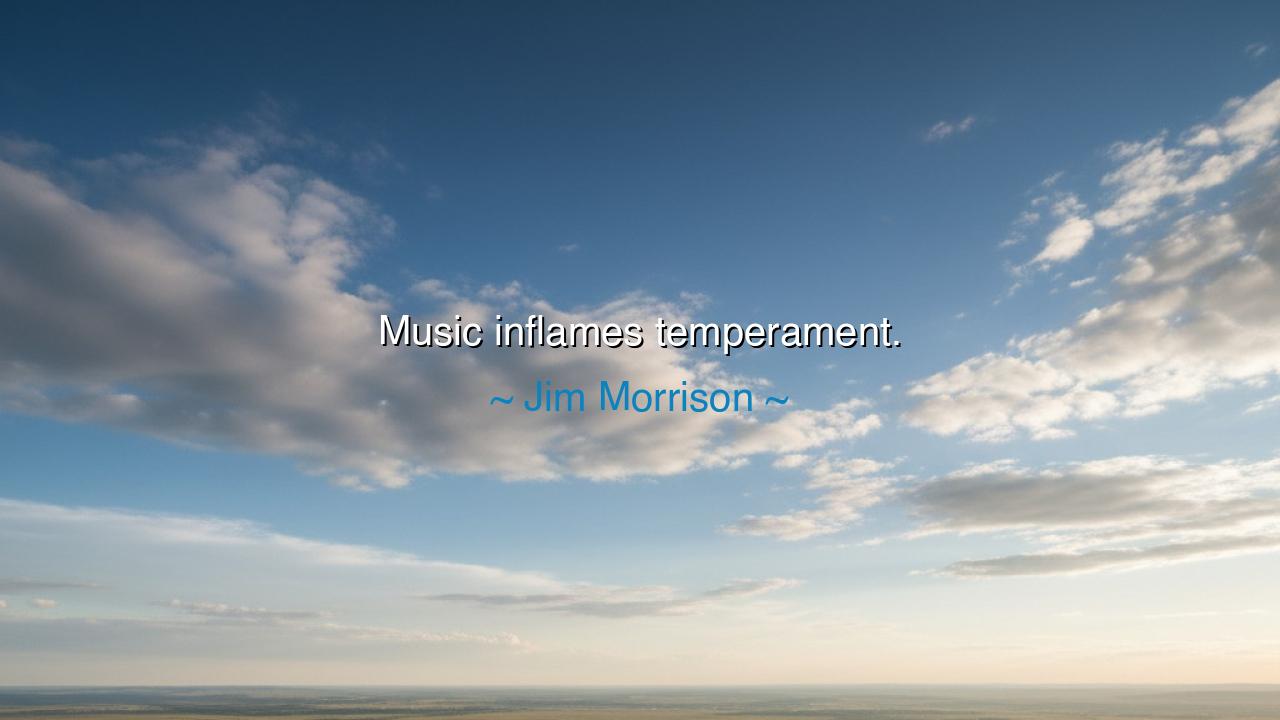
Music inflames temperament.






Hear the fiery words of Jim Morrison, the poet of rebellion and song: “Music inflames temperament.” In this utterance, he reveals the ancient and unshakable truth—that music is no mere ornament to the ear, no idle diversion, but a force that stirs the very essence of a person. It awakens what lies dormant: passion, rage, longing, and joy. It sets the heart ablaze and calls the soul to rise from slumber.
To say that music inflames temperament is to say that it intensifies the nature within us. The gentle man grows gentler when soothed by soft strings; the warrior feels his blood quicken when the drums of battle thunder. Music is the spark that magnifies what already dwells in the human spirit. The ancients knew this well. Plato warned that certain modes of music could make men unruly, while others nurtured discipline and harmony. The wise understood: to command music was to command the soul of a people.
Consider the Spartans before battle. They did not march in silence; they moved to the sound of pipes and flutes, their steps aligned, their courage sharpened. The rhythm fed their temperament, turning fear into focus, hesitation into resolve. Without a word spoken, the music transformed men into a living wall of steel. Here we see Morrison’s words embodied: music does not merely accompany action—it fuels it, ignites it, and drives it forward.
Even in more recent days, recall the songs of the Civil Rights Movement. When weary marchers raised their voices in hymns like “We Shall Overcome”, their courage was strengthened, their temperament transformed from despair into defiance. Music burned in them like a sacred flame, making ordinary men and women capable of extraordinary endurance. The songs did not end the struggle, but they gave the spirit strength to persist.
Yet Morrison, wild prophet of the Doors, also knew the darker flame. For music can inflame not only courage and love, but also desire and rage. A song can make the peaceful restless, the calm reckless, the sorrowful despairing. This is why music has always been watched carefully by rulers and priests—for it moves men more swiftly than sermons, and it can set fire to cities as easily as to hearts. Truly, music is a torch: in wise hands it gives light; in careless hands, it may burn all to ashes.
The lesson, then, is both beautiful and grave: guard the music you allow into your soul. Choose melodies that strengthen your spirit rather than poison it. Let your heart be inflamed toward courage, compassion, and endurance, not toward destruction or despair. Just as a man tends the fire upon his hearth lest it consume his home, so must you tend the music that shapes your temperament.
Practical action lies before you: seek music that lifts your courage when you falter, that soothes your sorrow when you grieve, and that inspires noble passion when you grow weary of the world. Share songs that bring unity, not division. And if you create music, be mindful of the flames you kindle, for you wield a power that can shape the souls of those who listen.
And so, remember Jim Morrison’s words: music inflames temperament. Treat it not as trivial sound, but as sacred fire. Let it burn within you to give light to others, to embolden your path, and to awaken the hidden power of your soul. For those who understand this truth will never again hear a song as mere notes, but as the breath of life itself—capable of setting hearts ablaze across all time.






AAdministratorAdministrator
Welcome, honored guests. Please leave a comment, we will respond soon